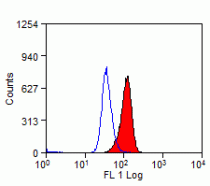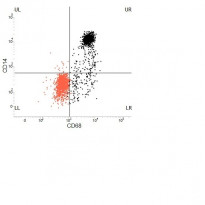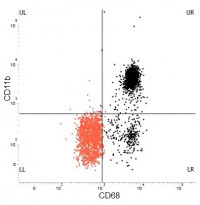ARG23069
anti-CD68 antibody [KP1] (FITC)
anti-CD68 antibody [KP1] (FITC) for Flow cytometry,ICC/IF and Human,Rat,Primates
Immune System antibody; Activated Macrophage/Microglia Study antibody; Neuroinflammation Study antibody; Active macroglial Marker antibody; M1/M2/TAM Marker antibody; Macrophage Marker antibody; M1 macrophage Marker antibody; Inflammatory Cell Marker antibody
Overview
| Product Description | FITC-conjugated Mouse Monoclonal antibody [KP1] recognizes CD68 Mouse anti human CD68 antibody, clone KP1 recognises the human CD68 cell surface antigen, a 110kD glycoprotein primarily expressed by macrophages and monocytes. |
|---|---|
| Tested Reactivity | Hu, Rat, NHuPrm |
| Tested Application | FACS, ICC/IF |
| Host | Mouse |
| Clonality | Monoclonal |
| Clone | KP1 |
| Isotype | IgG1 |
| Target Name | CD68 |
| Antigen Species | Human |
| Immunogen | Subcellular fraction of Human alveolar macrophages |
| Conjugation | FITC |
| Alternate Names | Macrosialin; CD antigen CD68; LAMP4; Gp110; GP110; SCARD1 |
Application Instructions
| Application Suggestion |
|
||||||
|---|---|---|---|---|---|---|---|
| Application Note | FACS: Membrane permeabilization is required for this application. Use 10 µl of the suggested working dilution to label 10^6 cells in 100 µl. * The dilutions indicate recommended starting dilutions and the optimal dilutions or concentrations should be determined by the scientist. |
Properties
| Form | Liquid |
|---|---|
| Purification | Purification with Protein G. |
| Buffer | PBS, 0.09% Sodium azide and 1% BSA |
| Preservative | 0.09% Sodium azide |
| Stabilizer | 1% BSA |
| Concentration | 0.1 mg/ml |
| Storage Instruction | Aliquot and store in the dark at 2-8°C. Keep protected from prolonged exposure to light. Avoid repeated freeze/thaw cycles. Suggest spin the vial prior to opening. The antibody solution should be gently mixed before use. |
| Note | For laboratory research only, not for drug, diagnostic or other use. |
Bioinformation
| Database Links | |
|---|---|
| Gene Symbol | CD68 |
| Gene Full Name | CD68 molecule |
| Background | CD68 is a 110-kD transmembrane glycoprotein that is highly expressed by human monocytes and tissue macrophages. It is a member of the lysosomal/endosomal-associated membrane glycoprotein (LAMP) family. The protein primarily localizes to lysosomes and endosomes with a smaller fraction circulating to the cell surface. It is a type I integral membrane protein with a heavily glycosylated extracellular domain and binds to tissue- and organ-specific lectins or selectins. The protein is also a member of the scavenger receptor family. Scavenger receptors typically function to clear cellular debris, promote phagocytosis, and mediate the recruitment and activation of macrophages. Alternative splicing results in multiple transcripts encoding different isoforms. [provided by RefSeq, Jul 2008] |
| Function | CD68 could play a role in phagocytic activities of tissue macrophages, both in intracellular lysosomal metabolism and extracellular cell-cell and cell-pathogen interactions. Binds to tissue- and organ-specific lectins or selectins, allowing homing of macrophage subsets to particular sites. Rapid recirculation of CD68 from endosomes and lysosomes to the plasma membrane may allow macrophages to crawl over selectin-bearing substrates or other cells. [UniProt] |
| Highlight | Related products: CD68 antibodies; CD68 Duos / Panels; Anti-Mouse IgG secondary antibodies; Related news: New antibody panels and duos for Tumor immune microenvironment Tumor-Infiltrating Lymphocytes (TILs) Exploring Antiviral Immune Response Anti-SerpinB9 therapy, a new strategy for cancer therapy RIP1 activation and pathogenesis of NASH |
| Research Area | Immune System antibody; Activated Macrophage/Microglia Study antibody; Neuroinflammation Study antibody; Active macroglial Marker antibody; M1/M2/TAM Marker antibody; Macrophage Marker antibody; M1 macrophage Marker antibody; Inflammatory Cell Marker antibody |
| Calculated MW | 37 kDa |
| PTM | N- and O-glycosylated. |
Images (3) Click the Picture to Zoom In
-
ARG23069 anti-CD68 antibody [KP1] (FITC) FACS image
Flow Cytometry: Human peripheral blood granulocytes stained with ARG23069 anti-CD68 antibody [KP1] (FITC). Permeabilisation was with Leucoperm.
-
ARG23069 anti-CD68 antibody [KP1] (FITC) FACS image
Flow Cytometry: Dot Blot showing FSC/SSC gated Human peripheral blood monocytes dual stained with ARG23069 anti-CD68 antibody [KP1] (FITC) at neat and anti-CD14 (A647) at neat. Isotype control pair in red. Permeabilisation was with Leucoperm.
-
ARG23069 anti-CD68 antibody [KP1] (FITC) FACS image
Flow Cytometry: Dot Blot showing FSC/SSC gated Human peripheral blood monocytes dual stained with ARG23069 anti-CD68 antibody [KP1] (FITC) at neat and anti-CD111b (A647) at neat. Isotype control pair in red. Permeabilisation was with Leucoperm.










